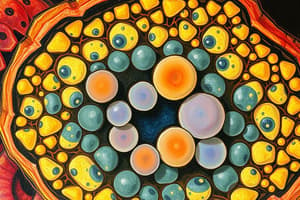Podcast
Questions and Answers
What is the primary function of ribosomes in a cell?
What is the primary function of ribosomes in a cell?
- Production of lipids
- Digestion of waste materials
- Production of proteins (correct)
- Storage of genetic information
Which organelle is responsible for packaging and storing important molecules?
Which organelle is responsible for packaging and storing important molecules?
- Golgi body (correct)
- Endoplasmic reticulum
- Cytoplasm
- Nucleus
What distinguishes the rough endoplasmic reticulum from the smooth endoplasmic reticulum?
What distinguishes the rough endoplasmic reticulum from the smooth endoplasmic reticulum?
- The type of proteins produced
- The presence of ribosomes (correct)
- The presence of DNA
- The size of the structure
How do lysosomes aid in the immune response of the body?
How do lysosomes aid in the immune response of the body?
What characteristic feature is found in the structure of the nucleus?
What characteristic feature is found in the structure of the nucleus?
Which structure is described as a thin layer of lipid molecules that surrounds a cell?
Which structure is described as a thin layer of lipid molecules that surrounds a cell?
What is the primary role of the mitochondria?
What is the primary role of the mitochondria?
Which organelle contains the genetic material of the cell?
Which organelle contains the genetic material of the cell?
What is one of the functions of vesicles in a cell?
What is one of the functions of vesicles in a cell?
In which type of cells would you expect to find a higher number of mitochondria?
In which type of cells would you expect to find a higher number of mitochondria?
Study Notes
Cell Membrane
- Thin layer of lipid molecules surrounding every cell.
- Semi-permeable, allowing selective passage of certain molecules in and out.
Cytoplasm
- Thick, clear liquid filling each cell.
- Contains thousands of dissolved molecules for cellular functions.
Nucleus
- Large, round structure typically located near the cell center.
- Enclosed by a nuclear membrane; houses and safeguards genetic information (DNA/chromosomes).
DNA/Chromosomes
- Long, string-like molecules representing genetic instructions.
- Each human cell contains 46 DNA molecules; specific to species (e.g., dogs have 78, houseflies have 12).
- Genetic variations cause differences among humans; only identical twins share identical DNA.
Ribosome
- Small organelles appearing as black dots within the cytoplasm.
- Essential for protein synthesis, including muscle proteins and digestive enzymes.
Endoplasmic Reticulum (ER)
- Series of folded membranes throughout the cytoplasm, functioning as molecular transport highways.
- Rough ER: Studded with ribosomes, giving it a bumpy appearance.
- Smooth ER: Lacks ribosomes, featuring a smooth surface.
Golgi Body
- Composed of curved membranes that resemble nesting bowls, surrounded by vesicles.
- Responsible for packaging and storing important molecules produced by the cell.
Vesicles
- Round, bubbly structures that store chemicals packaged by the Golgi body.
- Act as storage units until the cell requires the specific chemicals.
Lysosome
- Special type of vesicle filled with powerful digestive enzymes.
- Crucial for breaking down engulfed bacteria in white blood cells during immune responses.
Mitochondria
- Resemble jellybeans and are vital for energy production within the cell.
Studying That Suits You
Use AI to generate personalized quizzes and flashcards to suit your learning preferences.
Related Documents
Description
Dive into the fascinating world of cell biology and learn about the essential organelles that make up a cell. This quiz covers the cell membrane, cytoplasm, and nucleus, highlighting their functions and importance. Test your knowledge on how these components interact and support cell life.



